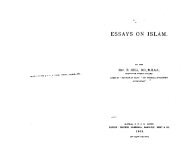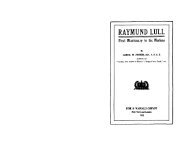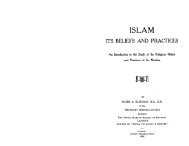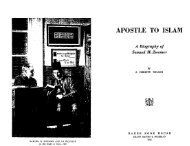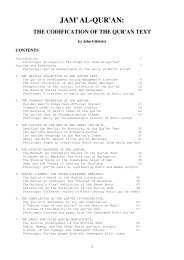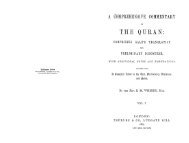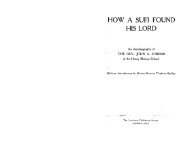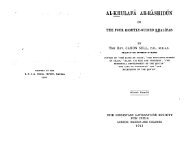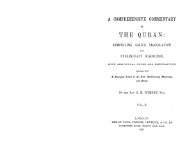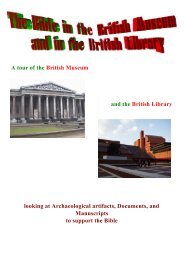Guillaume--Life of Muhammad.pdf - Radical Truth
Guillaume--Life of Muhammad.pdf - Radical Truth
Guillaume--Life of Muhammad.pdf - Radical Truth
You also want an ePaper? Increase the reach of your titles
YUMPU automatically turns print PDFs into web optimized ePapers that Google loves.
xxvi<br />
The <strong>Life</strong> <strong>of</strong> <strong>Muhammad</strong><br />
society would require us to look for such effusions. As Horovitz pointed<br />
out, in pre-Islamic poetry these poetical contests are frequent, and it<br />
might be added that in early Hebrew history verses are frequently inserted<br />
in the narratives and <strong>of</strong>ten put into the mouths <strong>of</strong> the heroes <strong>of</strong> the hour.<br />
Thus, apart from those poems which undoubtedly were called forth by the<br />
events they commemorated, poetry was an integral part <strong>of</strong> a racial convention<br />
which no writer <strong>of</strong> history could afford to ignore. Probably if all the<br />
poetry which 1.1. included in the Sira had reached that standard <strong>of</strong> excellence<br />
which his readers were accustomed to expect, none <strong>of</strong> these charges<br />
wC'uld have been levelled against him. But when he included verses which<br />
were palpably banal, and were at the same time untrue to circumstance,<br />
uninspired and trivial, as many undoubtedly are, the developed aesthetic<br />
sense <strong>of</strong> the Arabs which is most delicate where poetry is concerned rejected<br />
what he wrote. As ar-Juma!,>! said, he brought poetry itself into disrepute<br />
by the balderdash he admitted into his otherwise excellent work. And it did<br />
not improve matters that much that was good was mingled with more that<br />
was bad. It is more than likely that 1.1. himself was conscious that all was<br />
not well with this poetry, for the general practice <strong>of</strong> writers is to put the<br />
verse into the narrative at the crucial moment (as I.I. at ~imes does),<br />
whereas after the prose account <strong>of</strong> Badr and U!,>ud he lumps together a<br />
whole collection <strong>of</strong> verse by various 'poets'. It is as though he were<br />
silently saying 'This is what has been handed on to me. I know nothing<br />
about poetry and you must make your own anthology,'l Even so, whatever<br />
his shortcomings were, it is only fair to bear in mind that I.H. <strong>of</strong>ten inserts<br />
a note to the effect that the text before him contains lines or words which<br />
have not 1.1.'s authority.<br />
The subject is one that calls for detailed and careful literary criticism.<br />
The history <strong>of</strong>the cliches, similes, and metaphors needs investigation by a<br />
scholar thorougnly grounded in the poetry <strong>of</strong> the pre-Islamic and Umayyad<br />
eras. Until this preliminary work has been successfully accomplished<br />
it would be premature to pass judgement on the poetry <strong>of</strong> the Sira as a<br />
whole. Ancient poetry has suffered greatly at the hands <strong>of</strong> forgers,<br />
plagiarists, and philologists, and the diwans <strong>of</strong> later poets have not escaped<br />
the dishonest rawi. I:Iassan b. Thabit, the prophet's own poet, has many<br />
poems to his name which he would be astounded to hear, and there are<br />
comparatively few poets <strong>of</strong> whom it could be said that the diwans bearing<br />
their names contained nothing for which they were not responsible.'<br />
I And this was precisely his attitude if al-JumaJ::ri is to be believed.<br />
2 I should hardly care to go so far as to assert that the fifth-century poet tAmr b. Qami"a<br />
has exercised a direct influence on the poetry <strong>of</strong> the Sira; but the fact remains that there is<br />
a great similarity. It is inevitable that the themes <strong>of</strong> Arab verse should recur constantly.<br />
Beduin life varied little from generation to generation. Their horizon was bounded by<br />
deserts, and consequently camels and horses, war and its weapons, hospitality and tribal<br />
pride were constantly mentioned in song. To trace these themes back to their first singers<br />
would hi! a task that would leave little leisure for more pr<strong>of</strong>itable studies; but nevertheless<br />
it is worth noting tha t the following themes recur in 'Amr and the Sira: the generous man<br />
who slaughters camels for the hungry guest in winter when fsmine deprives even the rich <strong>of</strong><br />
Introduction<br />
xxvii<br />
Since these words were written two theses have been written in the<br />
University <strong>of</strong> London: the first by Dr. M. A. 'Azzam deals with the style,<br />
language, and authenticity <strong>of</strong> the poetry contained in the Sira; the second<br />
by Dr. W. 'Arafat with the Diwan <strong>of</strong>I:Iassan b. Thabit. A brief summary <strong>of</strong><br />
their findings will not be out <strong>of</strong> place here.<br />
Between the period covered by the Sira and the editing <strong>of</strong> the book<br />
itself loom the two tragedies <strong>of</strong> Karbala', when al-Husayn and his followers<br />
were slain in 61, and the sack <strong>of</strong> Medina in A.H. 63 when some ten thousand<br />
<strong>of</strong> the An~ar including no less than eighty <strong>of</strong> the prophet's companions<br />
are said to have been put to death. Much <strong>of</strong> the poetry <strong>of</strong> the Sira was<br />
meant to be read against the background <strong>of</strong> those tragedies. Its aim is to<br />
set forth the claims <strong>of</strong> the An~ar to prominence in Islam not only as men<br />
who supported the prophet when the Quraysh opposed him, but as men<br />
descended from kings. The prophet was the grandson <strong>of</strong> 'Abdu'l-Mu;<br />
talib, who was the son <strong>of</strong> Hashim and a woman <strong>of</strong> the B. aI-Najjar, and so<br />
<strong>of</strong> Yaman! stock. 'Your mother was <strong>of</strong> the pure stock <strong>of</strong> Khuza'a.... To<br />
the heroes <strong>of</strong> Saba' her line goes back', says the poet in his elegy on 'Abdu'l<br />
MUt\alib.'<br />
Apart from their great service to the prophet in giving him a home when<br />
Quraysh cast him out, the An~ar long before had been partners with<br />
Quraysh, for was it not Riza!,>, the half-brother <strong>of</strong> Qu~ayy, who came to the<br />
aid <strong>of</strong> the ancestors <strong>of</strong> Quraysh from the Yaman? Had it not been for the<br />
An~ar there would have been no Islam: had it not been for their ancestors,<br />
the poet implies, Quraysh would not have been established in Mecca.<br />
On p. 18 there is thinly disguised An~ar!-Shi'a propaganda: 'The one<br />
you killed was the best <strong>of</strong> us. The one who lived is lord over us and all <strong>of</strong><br />
you are lords' would be recognized by many as a reference to the killing <strong>of</strong><br />
a1-Hu~ayn and the 'lords' would be the Umayyads. The account <strong>of</strong> the<br />
Tubba's march against Mecca and his great respect for its sanctity stands<br />
in clear contrast with the treatment it received from the Umayyads when<br />
al-I:Iajjaj bombarded it.<br />
wealth, when even kinsmen refuse their help; the man who entertains when the camels'<br />
udders are dry; the cauldron full <strong>of</strong> the hump and fat <strong>of</strong> the camel; those who devote the<br />
game <strong>of</strong> maysir to hospitality, distributing the charge among themselves as the arrows dic·<br />
tate; the milk <strong>of</strong> war; ws'r a milch camel; war drawing blood like buckets from a weU; a<br />
morning draught <strong>of</strong> the same; the sword blade polished by the srmourer; journeys in noonday<br />
heat when even the locust rests; the horse that can outrun the wild ass; the flash <strong>of</strong> the<br />
Bun on the helmets <strong>of</strong> the warriors; the chain armour shining like a rippling pool. However<br />
interesting this comparison might prove to be, the presence <strong>of</strong> these cliches and themes in<br />
other poets makes if hazardous to assert that 'Amr had a predominating influence. More.<br />
over, what w,eseek is .. pseudo-poet <strong>of</strong> Umayyad times; and here a hint thrown out by a<br />
former colleague, Dr. Abdullah al.Tayyib, to the effect that the poetry <strong>of</strong> the Sira and that<br />
inWaq'at ~iffin is very similar, if fo1l9wed up would probably lead to some interesting discoveries.<br />
LH.'s notes would be found interesting in this conne.rion. On p. 790 he points<br />
out that the words 'We have fought you about its interpretation as we fought you about its<br />
divine origin' were spoken by "Arnmir b. Yisir in reference to another battle '[~iffin] and<br />
could not have been uttered by "Abdullah b. Rawi\l:la at the conquest <strong>of</strong> Mecca, because the<br />
Meccans, being pagans, did not believe in the Quran, 80 that there was no question <strong>of</strong> a<br />
rival interpretation. I p. 113.



